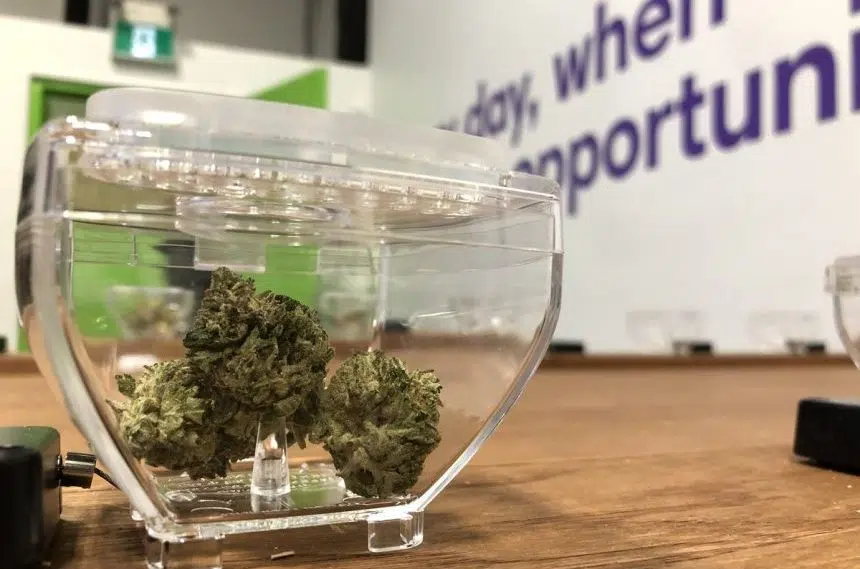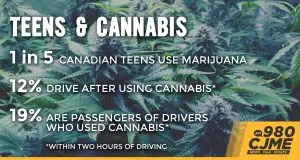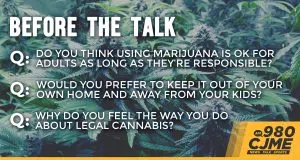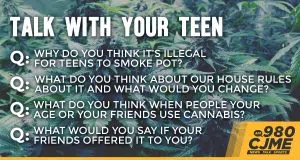With marijuana now legal across the country, many parents might find themselves having the pot talk with their kids.
While it might be legal for adults, using marijuana under the age of 19 is still against the law.
Even as a legal substance, studies show there are still serious risks to young people using marijuana because it can have a particularly harmful effect on developing brains.
Young people are twice as likely to use marijuana as adults and Canadian youth have the second-highest rate of use in the world. According to Statistics Canada, one in five teenagers between 15 and 19 have reported using marijuana in the last year.
When it comes to driving high, 12.6 per cent of young people reported driving within two hours of using pot and 19 per cent of 16 to 19-year-olds said they were passengers in a car with a driver who used marijuana.
TEENS AND POT
- 1 in 5 Canadian teens used marijuana
- 12 per cent drove after using pot
- 19 per cent were passengers of drivers who used pot*
*within two hours of driving
Questions to ask yourself before the pot talk
- Do you think using marijuana is OK for adults as long as they’re responsible?
- Why do you feel the way you do about legal weed?
- Would you prefer to keep it out of your own home and away from your kids?
YOUNG CHILDREN 0 to 8
It might sound too young, but small children are learning by watching, copying behaviour and asking questions so it’s a good time to start.
Be a good role model.
Answer any of their questions honestly at a level they can understand.
Teach them to say “no” to things that are unsafe or make them feel uncomfortable.
Practice good decision-making skills to help them feel confident.
PRETEENS 8 to 13
Preteens will likely be more curious about marijuana and will probably get a lot of mixed messages from their friends and the internet. So it’s a good time to get informed to provide accurate information.
Take time to talk about your family values around cannabis while driving or at mealtimes and what matters to them.
Answer their questions about pot with the facts without exaggerating or using scare tactics.
Help them understand the legal consequences and health risks of smoking marijuana while underage.
Stay involved in their lives by planning family activities and getting to know their friends and friends’ families.
Encourage healthy ways to have fun and develop positive self-esteem through activities that interest them.
Teach them how to make smart choices and resist peer pressure.
TEENS 13 to 19
Teenagers are at the stage where they may consider marijuana to be a fun and safe way to party, but they should know about the possible consequences.
Teach your teen to consider what could happen if they smoke pot like:
-Doing something embarrassing and having video or photos shared on the internet.
-Getting sick or injured or getting involved in a car crash.
-Getting in trouble at school or at home or even being charged with possession.
Make sure they know the laws about underage possession and driving high.
Set your own rules and boundaries about using marijuana.
Pick natural times to bring up the conversation like while watching a movie or show involving pot or when the topic comes up in the news.
Be open and honest to encourage them to share their own thoughts and avoid using scare tactics to answer questions.
Questions to help start the pot talk with your teen.
- Why do you think it’s illegal for teens to smoke pot?
- What do you think about our house rules about it and what would you change?
- What do you think when people your age or your friends use cannabis?
- Does it bother you when they do or what would you say if they offered it to you?
WHAT ARE THE RISKS?
Brain development – heavy marijuana use in teenagers can permanently alter brain chemistry.
Impaired driving – it slows your reaction time and attention span and could lead to crashes or charges.
Mental health – frequent use of marijuana at a young age can increase the risk of suicide, depression and anxiety as well as a severe mental illness for those with a family history of psychosis or schizophrenia.
Addiction – you can get addicted to pot and youth are especially vulnerable because their brains are developing.
Check out some of these websites and resources to help kick-start the pot talk:
Drug Free Kids: Cannabis Talk Kit
Centre for Addictions and Mental Health: The Blunt Truth Lower Risk Cannabis Use Guidelines for Youth
Saskatchewan Government: Talking to Kids about Cannabis
Health Canada: Talking to Teens about Drugs














